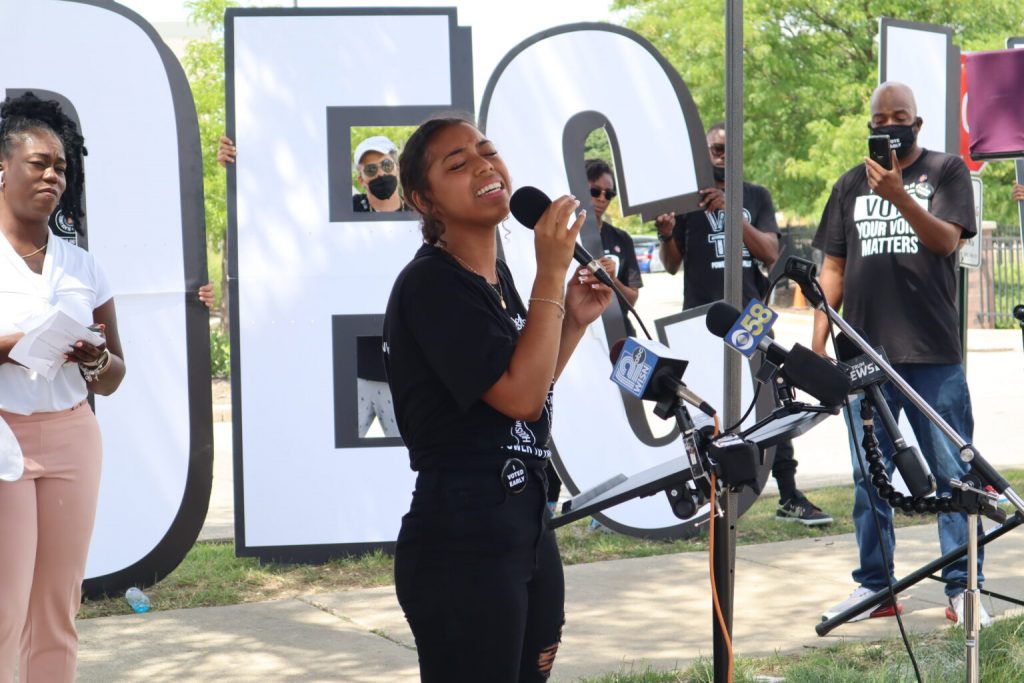Your Vote Can Help Save Democracy
Wisconsin has made progress. A robust voter turnout in November will assure that continues.

Mikayla Hughes singing during an early voting gathering at the Midtown Center in Milwaukee. (Photo | Isiah Holmes)
“The cure for the ills of democracy is more democracy,” is a famous maxim from the early 20th century that has been variously attributed to the prominent American social worker and women’s suffrage leader Jane Addams, to the leading American philosopher and psychologist of that era, John Dewey and, most famously, to the iconic former Wisconsin Governor and U.S. Senator Robert M. “Fighting Bob” La Follette. Regardless of who actually coined that phrase, it was utilized by all three and has proven to be predictive and prescriptive time and again over the years. Now, it may never be more applicable and essential for the survival of our 235-year-old American Experiment in representative self-government than it is today, in 2024.
This year so far in Wisconsin has been an astonishingly positive period for the advancement of democratic engagement and participation after more than a decade of continuous diminishment and destruction of what was once considered the nation’s foremost laboratory of democracy.
Fair maps
In February, after 13 years of enduring one of the most partisan, unfair and unrepresentative political gerrymanders in the nation of our state’s legislative districts, Wisconsinites rejoiced as Gov. Tony Evers signed into law new, much fairer and more competitive state legislative voting maps. The new maps are in effect for 2024 and likely will remain in place until the end of this decade. These maps favor neither Democrats or Republicans. Instead, they much more accurately reflect the very closely divided, 50/50, “blue/red” partisan divide that is Wisconsin, arguably the most “purple” state in the nation.
The return of ballot drop boxes
In July the Wisconsin Supreme Court overturned a misguided and injurious decision made two years ago by the previous court majority that wrongly prohibited the use of secure ballot drop boxes for all Wisconsinites. Disabled and elderly voters and people who areas where voting hours are limited used drop boxes to safely and securely return absentee ballots to election clerks in time for them to be counted on Election Day. Eliminating drop boxes was a callous voter suppression measure that was put in place only in Wisconsin and in about a dozen deep red southern and western states. Fortunately, the current Wisconsin Supreme Court majority corrected this travesty of justice and in many (but not all) communities, ballot drop boxes have been restored for the Nov. 5 election and beyond.
Voters reject constitutional amendments
Finally, in August during the partisan primary elections in Wisconsin, voters rose up and decisively defeated two constitutional ballot measures that would have hamstrung the ability of the governor of Wisconsin to distribute federal funds allocated to Wisconsin in times of emergency, such as a natural disaster or pandemic, without the permission of a small group of powerful partisan legislators. When voters were educated about the effect of this last gasp of a gerrymandered partisan legislative majority to seize more power and further upset the critical balance of political power in this state, voters resoundingly voted “No!” Voter turnout in August was higher in this state in a partisan primary election than any other in the past 60 years.
These three momentous and heartening victories for all of the voters of Wisconsin and for democracy signify that if citizens get engaged and informed they will support the expansion of voting rights, people empowerment and the preservation and enhancement of democratic norms and traditions and will defeat attempts to curtail these liberties. The recent developments in Wisconsin also demonstrate that a fully engaged citizenry and very robust voter turnout are as critical to the survival of democracy as oxygen is to the act of breathing and to life itself.
The cure for the ills of democracy in Wisconsin and nationally is voting. When we vote we help to cure the sickness of citizen disengagement that afflicts us as well as the despair, pessimism and cynicism that accompanies that sickness. When we vote we become a healthier and more empowered citizenry. The upcoming election on Nov. 5 is the most important and consequential of any for most of us in our lifetimes. There is no excuse for not actively participating in this election by, at the very least, voting. And each of us can and should do even more to promote voting by expressing its urgency with family members, friends, neighbors, and even strangers if we are able. Vote as if our country and democracy depend on it because in a very real and tangible way, it does.
Since 1996 Jay Heck has been the Executive Director of Common Cause in Wisconsin, the state’s largest non-partisan citizens political reform advocacy organization with more than 12,000 members and activists.
The fight for the survival of democracy will be won at the ballot box was originally published by Wisconsin Examiner.
Op-Ed
-
Wisconsin Candidates Decry Money in Politics, Plan to Raise Tons of It
 Dec 15th, 2025 by Ruth Conniff
Dec 15th, 2025 by Ruth Conniff
-
Trump Left Contraceptives to Rot; Women Pay the Price
 Dec 8th, 2025 by Dr. Shefaali Sharma
Dec 8th, 2025 by Dr. Shefaali Sharma
-
Why the Common Council’s Amended Budget is Good Policy for Milwaukee
 Nov 20th, 2025 by Alds. Marina Dimitrijevic and Russell W. Stamper, II
Nov 20th, 2025 by Alds. Marina Dimitrijevic and Russell W. Stamper, II




















There are so many ways available now for everyone to vote that there really are no good reasons not to.
Doctors always tell us that exercise is good, and has positive effects on so many different aspects of our general health. Regardless of your views and beliefs, it is incumbent on every eligible voter to exercise their right to vote in the November election.
Just like physical exercise, even if going into it you feel like you don’t want to do it, I guarantee that when you’re finished you will feel better for having participated in it.
“Not voting” for one or more offices on the ballot IS democracy in actiion, too. It’s saying that I choose to support “neither” or “none” of the candidates on this ballot. Writing in another name is another way to make this statement.
As imperfect as voting may seem in selecting candidates, it is the founding basis of a peaceful way of life.
Campaigns can involve heated discussions and rhetoric, but these exchanges should never devolve into violence. Citizens should understand the candidates’ character, truthfulness, and the long-term consequences of their policies and then vote accordingly.
Democracy is at stake in every election because the ability to have elections that are open, free, accessible, and fair is the basis of Democracy itself. Those who would subvert Democracy attack this voting process. Those who would subvert Democracy challenge, without factual basis, the outcome of demonstrably fair elections. Those who would subvert Democracy work to violate laws meant to protect the integrity of elections, campaigns, and their financing. A contentious election can reveal many insights about the candidates’ character and ideas.
Our vote, the ballot box, and our ability to select among candidates based on character and consequences are the powerful, peaceful means of enacting political change.